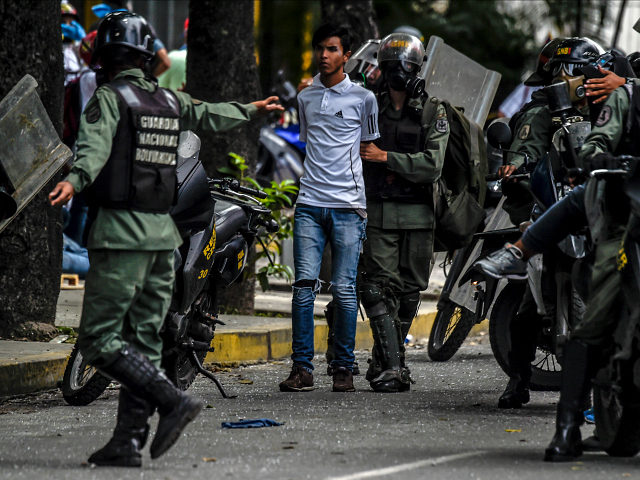An NGO documenting police repression in Venezuela announced on Monday that the government arrested 96 people during Sunday’s vote for a parallel legislature, adding to over a dozen known deaths amid police attacks on protesters Sunday.
The Venezuelan Penal Forum’s executive director Alfredo Romero announced that his group had found data to confirm the arrests of 34 people in Zulia state, 14 in western Táchira, and 11 in Mérida state. The capital, Caracas, saw only five arrested. Venezuela banned public assemblies of any kind on Friday following months of daily protests beginning in late March; the anti-socialist opposition called protesters to the streets anyway and have since convened more protests for Monday.
Reports circulating Monday afternoon suggest that at least 16 people died on Sunday during the election. Multiple victims were shot and killed by roving chavista gangs known as colectivos, which act in a paramilitary capacity to intimidate and kill protesters. In some limited instances, protesters took to attacking the military – in Lara state, for example, protesters stripped two soldiers naked and beat them with sticks.
The Venezuelan newspaper El Nacional has confirmed 15 deaths in the 24 hours of election day, among them a number of teenagers attacked by government forces in protests. All of Venezuela’s 24 states – except two: the lightly populated Amazonas region and the rural state of Delta Amacuro – experienced protests on Sunday despite the ban on public assemblies.
Despite widespread international demand not to hold the vote, the socialist government of dictator Nicolás Maduro opened polling stations Sunday encouraging Venezuelans to vote for local representatives to the “national constituents’ assembly,” a fabricated parallel legislature meant to usurp the power of the opposition-held National Assembly. Only socialist candidates, including First Lady Cilia Flores, appeared on the ballots of Sunday’s vote.
The government intends to install the constituents’ assembly and grant it the power to draft a new constitution, codifying Maduro’s dictatorship following years of complaints that his attempts to perpetuate the socialist party in power are a direct violation of the current constitution. This is the second major attempt to override the opposition legislature this year. In March, the Supreme Court ruled itself the national lawmaking body and annulled the National Assembly, a ruling it eventually rescinded after international condemnation and a string of daily protests.
Reports Sunday suggested that most Venezuelans boycotted the vote, given that the government did not place alternative candidates on the ballots. The Associated Press reported that “dozens of polling places were virtually empty, including many that saw hours-long lines of thousands voting to keep the government in power over the last two decades.” Opposition leaders estimated that 12 percent of eligible voters participated and that many of these submitted empty ballots in protest.
Late Monday morning, National Electoral Council chairwoman Tibisay Lucena announced on television that over eight million Venezuelans voted in the election, according to the government. She had previously claimed a “99 percent” participation rate.
Despite widespread acts of violence against peaceful protesters, the government claimed in state media outlet VTV that the election occurred “in complete normalcy” and declared it a success.
“This is not a strong government, this is a defeated government,” Julio Borges, the opposition head of the National Assembly, told reporters Sunday. “Nobody thinks Maduro got more votes today than when he was elected.” Maduro allegedly won little more than three million when up for election in 2013.
Opposition leaders have called for protests to begin at noon local time on Monday. “At 12 PM, wherever you are, let’s go out and protest all over the country,” Henrique Capriles, governor of Miranda state and two-time presidential contender against Maduro, told reporters. “The idea is to protest around the country in honor of the 16 people murdered by state security and against this fraudulent process that the government will claim in a few hours brought out millions of voters.”

COMMENTS
Please let us know if you're having issues with commenting.